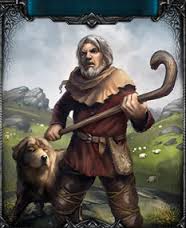 This week’s reading begins with the story of Yosef, or Joseph: “Yosef hayah ro’eh et achav- Joseph was a shepherd with his brothers… v’hu na’ar et b’nei Vilha v’et b’nei Zilpa- and he was a youth with the sons of Bilha and Zilpa...” It then says that he brought evil reports about his brothers to their father. Now the word for “shepherd” is ro’eh, and the word for “evil” is ra’ah- exactly the same letters, just voweled a little differently, hinting at a connection between shepherding and judging others. This is also reflected in the wording. A more straightforward way of saying that he was a shepherd with his brothers would be “hayah ro’eh im achav”- instead of “hayah ro’eh et achav”- which could be read that he’s being a shepherd at his brothers. This hints at two different levels of what’s going on. On the surface, Joseph and his brothers are out shepherding the sheep. But at the same time, Joseph sees himself as shepherding his brothers. He feels that he’s above them, judging them and tattling on them to their father. His vision of himself as above the rest of his family is of course prophetic- he eventually becomes an actual ruler with Pharaoh in Egypt. But at this point in the story, his leadership is immature- as it says, “V’hu na’ar- and he was a youth.” There’s a level of your own being that is above everything. It's the place within you that it sees the fullness of whatever arises in your experience, yet remains free from it, unencumbered by whatever your situation is. That level of inner freedom is simple awareness. Another name for it is Hokhmah or Wisdom, because from that place of awareness, wisdom naturally flows and can guide you in your particular situation. So your awareness is above your situation, on one hand, yet offers its steady guidance at the same time- just like a ro’eh- a shepherd- guides the flock, yet is not itself a sheep. The thinking mind, however, loves to claim the wisdom of awareness for itself in order to feed the ego. The ego thinks, "This is my wisdom"- and then gets gratification from believing itself to be above others. That’s Joseph as the na’ar- the youth- who brings evil reports. As long as the immature mind coopts the wisdom of awareness, the ro’eh becomes ra’ah- an evil shepherd. So what’s the remedy? The remedy is hidden within the letters. The words ro’eh and ra’ah are Reish-Ayin-Heh. The middle letter, Ayin, literally means “eye,” hinting at awareness as the deepest identity of the shepherd. The Reish literally means “head,” hinting that as long as the “head” is ruling the “eye”- as long as the thinking mind claims awareness for itself, the shepherd is evil. But if you change the Ayin to an Alef, the letter of Oneness, then the word becomes Re’eh which means, “see.” When you simply see, not in the literal visual sense but in the sense of simple perception, then you can notice the antics of the mind and ego and not get seduced by them. From this comes mature leadership, where the wisdom that pours into the mind is not coopted or claimed, but is humbly received as a gift. So on this Parshat Vayeyshev, the Sabbath of Dwelling, may we practice dwelling in the simple Presence and receive the gift of guidance from the Ultimate Shepherd. May we be guided by this inner wisdom on a path of love, renewal and healing. Good Shabbos!!! -brian yosef
2 Comments
Yosi
12/24/2016 06:22:13 am
What if we interpret the ayin as the nothingness?
Reply
Brian Yosef
12/27/2016 03:13:18 pm
Yes that works too! Because the "seeing" is nothingness in the sense of no-thing in particular. This is also connected in that to get the meaning of nothingness you have to do the same kind of letter switcharoo- spelling ayin with an alef, not the letter ayin...
Reply
Leave a Reply. |
Archives
July 2024
|
 RSS Feed
RSS Feed